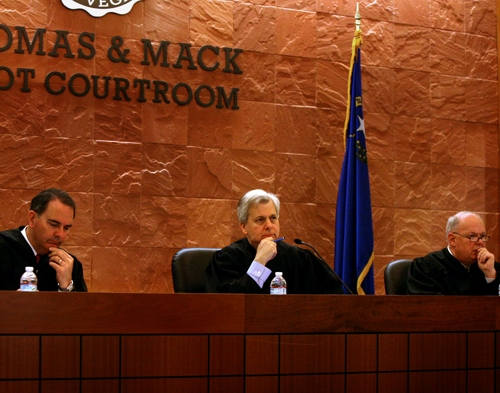Federal appeals panel hears arguments in Rizzolo case in Las Vegas
In a rare Las Vegas visit, a federal appeals panel heard arguments Monday in former strip club owner Rick Rizzolo's bid to overturn his nine-month prison sentence for violating the terms of his 2008 supervised release.
Rizzolo, who is serving his prison time in California, is challenging the decision handed down in July by Senior U.S. District Judge Philip Pro, who concluded the former Crazy Horse Too operator had deceived his probation officers. The violations occurred after Rizzolo, long suspected of having ties to organized crime, had served 10 months of a one-year prison sentence for a felony tax conviction.
On Monday, a three-judge panel from the San Francisco-based 9th U.S. Circuit Court of Appeals spent about half an hour listening to arguments at the University of Nevada, Las Vegas' Boyd School of Law from Rizzolo's lawyer, Dominic Gentile, and Assistant U.S. Attorney Peter Levitt.
More than 150 people, mostly law school students, observed the hearing as all three appeals judges, including Jay Bybee of Las Vegas, peppered both lawyers with questions. Bybee is a senior fellow in constitutional law at the law school.
At one point, when pressed by 9th Circuit Judge N. Randy Smith of Idaho, Gentile acknowledged that he wasn't contesting the acts committed by Rizzolo that prompted Pro to send the topless club owner back to prison.
"Isn't that the end of the story?" Smith asked.
Gentile responded that Pro had abused his discretion when handing out the additional prison time, which violated the federal law governing the judge's handling of the sentence.
The appeals panel did not issue an opinion after the hearing.
Among those attending the hearing was Las Vegas restaurateur Freddie Glusman, a longtime Rizzolo friend. Glusman said Rizzolo expects to be released to a halfway house in Las Vegas soon to finish his prison time.
Rizzolo surrendered to federal prison officials on Sept. 14.
After his release, Rizzolo then will have to undergo two more years of supervised release, according to Pro's decision.
Federal prosecutors sought the extra prison time, alleging Rizzolo was living a wealthy lifestyle while on supervised release using funds he hid from authorities. At the same time, Rizzolo was failing to pay millions of dollars in restitution to Kirk Henry, a Kansas City-area tourist crippled in a fight outside the Crazy Horse Too in September 2001, prosecutors argued.
Assistant U.S. Attorney Eric Johnson, who led the 2006 criminal prosecution of Rizzolo, contended last year that Rizzolo had concealed from probation officers a series of lucrative financial transactions, including several with offshore trust accounts. Many of the transactions were related to $1 million from the sale of a Philadelphia strip club one day before his release, Johnson said.
Johnson also accused Rizzolo of failing to pay the Internal Revenue Service more than $2.5 million in back taxes.
The U.S. Marshals Service took control of the now-shuttered Crazy Horse Too, once a hangout for celebrities, politicians and underworld figures, more than four years ago but could not find a buyer in a depressed real estate market.
In July, Canico Capital Group, the Southern California investment firm that owns the property's first deed of trust, bought the club for $3 million at a public auction.
Contact reporter Jeff German at jgerman@reviewjournal.com or 702-380-8135.






















